With data showing that one in eight women will develop breast cancer in their lifetime, it’s likely that you or someone you know will be affected by the most common cancer among women in the United States, second only to skin cancer.
“The statistics don’t really hit home until you or someone you know is diagnosed with breast cancer,” said Stephanie Duncan (pictured above), a breast cancer survivor and CalPERS team member. “But given the odds, it’s likely you’ll be affected at some point in your life. Even men can be diagnosed with breast cancer. That’s why early screening, self-exams, education, and awareness are so important.”
In recognition of Breast Cancer Awareness Month, we’re sharing some CalPERS members’ survivorship stories.
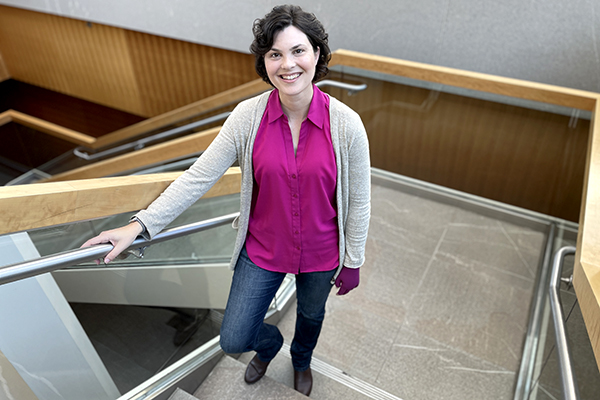
Stephanie Duncan, Associate Governmental Program Analyst, CalPERS
Just before her 41st birthday, Stephanie Duncan discovered a pea-sized lump in her breast. When it didn’t go away, she scheduled a mammogram, which led to an ultrasound and, eventually, a biopsy. A week later, she received the official diagnosis — breast cancer. It took several more weeks to confirm that she had stage 1B breast cancer.
“If this had happened before 2018, when breast cancer staging guidelines changed, I would have been considered stage 3 due to the size of the largest tumor,” she explained.
Her treatment journey was intense. Duncan underwent a double mastectomy with immediate reconstruction, followed by 16 rounds of chemotherapy, a second surgery to remove additional lymph nodes on her left side, and 28 rounds of radiation. Today, she manages mild lymphedema with a compression sleeve on her left arm and hand and takes daily medication.
Now 46, Duncan is dedicated to sharing her story to support others facing a breast cancer diagnosis. “Surviving breast cancer has caused me to reprioritize what’s important in my life and cherish the time I have,” she said. “I’ve been taking more trips, getting involved in new activities, and spending time with people I care about.”
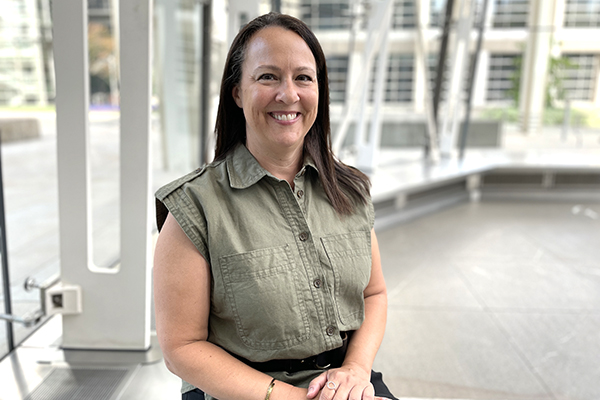
Janette Novinski, Staff Services Manager Specialist, Department of Cannabis Control
Janette Novinski was diagnosed with breast cancer just three weeks before her 50th birthday — and on only her third day working at CalPERS.
“When I learned the doctors ‘found something’ the week before, I was overwhelmed at the thought of telling my new team leader that I might have cancer and would need months of treatment,” Novinski shared. “But not only did my team welcome me with open arms, my leadership team truly exemplified what it means to be supportive.”
Within two weeks of her diagnosis — which was stage 1, hormone-positive breast cancer that spread to her lymph nodes — Novinski had a lumpectomy, followed by four rounds of chemotherapy, 25 rounds of radiation, and five years of hormone therapy medication. After 20 rounds of radiation, she developed pericarditis, an inflammation of the lining of the heart.
Novinski said undergoing a life-threatening disease while learning a new role and acclimating to a new work culture shaped her early experiences at CalPERS.
“In all my years working for large and small corporations, I never felt a true sense of belonging like I did at CalPERS,” she said. “I lost my hair and wore a turban my first six months of employment, so my team leader suggested we dress as pirates for Halloween and all wear headpieces. I felt like I belonged despite my challenges.”
Today, Novinski works for the Department of Cannabis Control, is cancer-free, and reflects on her journey at CalPERS with deep gratitude — not only for the support she received during her treatment, but for the resilience she discovered within herself.
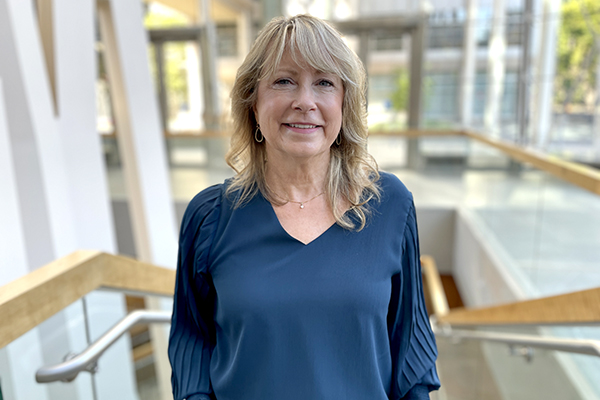
Susan Forrer, CalPERS Retiree
Susan Forrer’s grandmother died from breast cancer in her early 40s, so when Susan was concerned she’d suffer a similar fate, she got a mammogram that revealed a rare and aggressive type of cancer.
“I had just turned 50 when I was diagnosed,” Forrer recalled. She had a lumpectomy the next week and started chemotherapy shortly after the surgery.
“I was very blessed that I didn’t have many immediate side effects from the chemo other than temporary loss of hair and taste, and sudden onset of menopause,” she said. “However I continue to experience ongoing health issues from chemo like osteoporosis.”
Following a couple months of chemotherapy, Forrer underwent six consecutive weeks of daily radiation treatments. A few months later, she began her career at CalPERS and got involved in the former Jammin’ for the Cure team, which raised funds for breast cancer advocacy and research.
Today she’s grateful to be alive and wants to spread the word of early detection. “If sharing my story convinces even one person to get a mammogram, then I’m happy to share it,” she said. “I definitely know the feeling that life is short and we need to remember to enjoy every day.
“As I step into retirement, I feel especially grateful to be able to enjoy this new chapter as a breast cancer survivor. Life has given me challenges, but also so many blessings, and I’m looking forward to embracing the days ahead with gratitude and joy!”
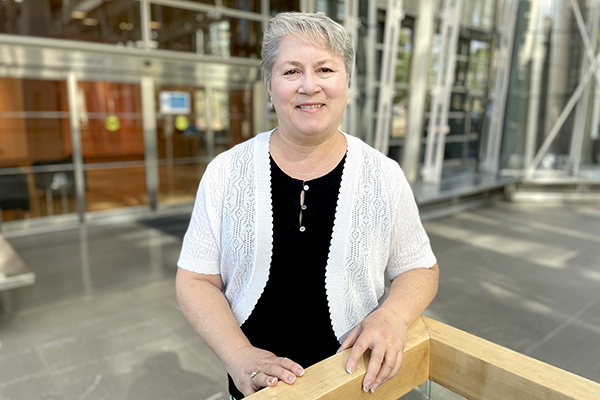
Yvonne Guerra, Staff Services Manager, CalPERS
Yvonne Guerra was determined not to let breast cancer stand in the way of her daughter’s senior year of high school.
“There was a trip to New York with her dance team coming up, plus her high school graduation and 18th birthday right around the corner,” Guerra recalled. “It felt like the worst possible time for this health challenge, but I told myself, ‘I won’t let cancer ruin any of it.’”
In 2014, an initial mammogram revealed something “suspicious, but tiny.” Further testing — including another mammogram, an ultrasound, and an MRI — led to a biopsy, which ultimately confirmed Guerra’s diagnosis.
In February 2015, she was diagnosed with stage 1 breast cancer in one breast, which was both ductal and lobular. Presented with several treatment options—a lumpectomy, a lateral mastectomy, or a bilateral mastectomy—Guerra chose a bilateral mastectomy with reconstruction. “I did not want to risk going through this a second time with the left breast,” she said.
“I was already in menopause and there was no chance for more children, so I saw this as an opportunity for breast reconstruction,” Guerra said jokingly. “But, of course, life threw me a curveball. Initially, I was told I wouldn’t need chemo or radiation, but the lymph node sample revealed microscopic cancer.”
That meant undergoing four rounds of chemotherapy. “The only time I broke into tears was when I had to shave my head because my hair started falling out,” Guerra said. After chemo, she had reconstructive implants placed, followed by six weeks of radiation. Despite it all, Guerra scheduled every appointment and procedure around her daughter’s milestones. Cancer didn’t ruin a single moment.
Guerra is not only grateful for each day but also a passionate advocate for annual mammograms. “Given where my cancer was located, it wouldn’t have been detected through self-exams until it had reached a later stage,” she said.
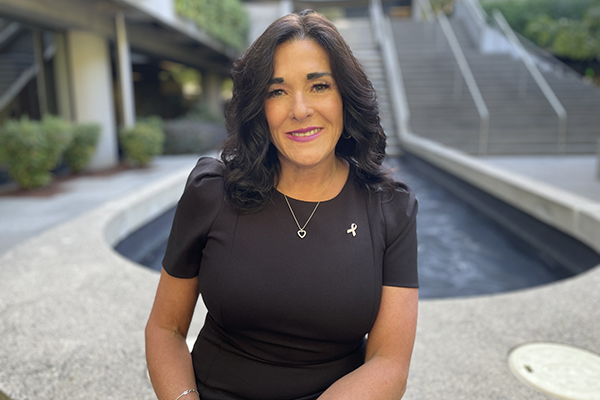
Kim Malm, Deputy Executive Officer, CalPERS
In September 2023, while getting ready for her 40th high school reunion, Kim Malm discovered a lump in her breast. Having previously battled breast cancer in 2017, the CalPERS deputy executive officer quickly moved past the initial shock. She immediately contacted her oncologist and scheduled an ultrasound that very same day.
Five days later, she underwent an ultrasound, but the results were inconclusive, leading to a scheduled biopsy.
The next day, Malm received the results: benign — no cancer. After nearly a week of uncertainty and keeping it to herself, she was ecstatic.
“That was a tough week, and it’s why I’m diligent about paying attention to my body every day,” she said. “It can happen anytime and can pop up again — even if you’ve had it.”
Malm was first diagnosed with breast cancer at 52, while serving as the officer in charge of CalPERS during the July offsite board meeting. It all began with a follow-up call regarding her recent annual mammogram.
“I didn’t think much of it at first—this happens to many women,” Malm recalled. “I even told them I could come in later that week or the following week when the executive team returned. But then the nurse said, ‘How about tomorrow?’ That’s when things got real, real quick.”
Malm initially underwent a lumpectomy, but not all the cancer was removed. She then had a mastectomy with reconstruction. Fortunately, she didn’t need chemotherapy, as doctors determined the risk of the cancer returning was low.
Today, Malm openly shares her journey and the lessons she’s learned along the way, including the importance of surrounding herself with positive people and making healthier lifestyle choices. While she admits these habits can sometimes fluctuate when work or home life gets hectic, her commitment to prioritizing better choices remains unwavering.
“Most stress comes from how you respond to life, not from life itself. Adjust your attitude,” she said. “Remember to prioritize what matters, eat healthy, stay active, maintain a positive outlook, nurture your support system, and take time to slow down and enjoy the journey.
“The fight against cancer never truly ends,” Malm said. “I just focus on doing my part by making healthy choices to help prevent it from coming back.”
Are you a breast cancer survivor with a story to share? We’d love to hear from you! Your story could be featured in future CalPERS communications. If you’re interested, please contact us at editor@calpers.ca.gov.
